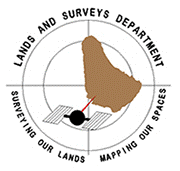2023: National Digital Parcel Fabric (NDPF) for Barbados
The Ministry of Industry, Innovation, Science and Technology (MIST), the Lands and Surveys Department (Lands & Surveys) and Martin Newby Consulting Ltd. (MNC) worked collaboratively on the National Digital Parcel Fabric (NDPF) project for the Government of Barbados successfully.
All active Land Tax parcels as of August 2022 were mapped or accounted for. Parcels were created using the best possible source data and survey control and compiled into a single Esri’s Parcel Fabric for ArcGIS Pro. The fabric contains over 126,000 unique Land Tax parcels and underwent extensive quality assurance (QA) controls to ensure that it is consistent and reliable. This single, complete, and trusted fabric is now sustainable with Esri’s Parcel Management suite. This enables Lands & Surveys of Barbados and their GIS resources the ability to effectively maintain parcels in a foundational data layer that can be published online. The published fabric serves as the graphical portal for access to land-related documents and of land-based e-services, and the recorded parcel data accuracy supports its use as the basis of integration for other GIS datasets.
In 2018, the Government of Barbados (GoB) announced and began implementation of the Barbados Economic Recovery and Transformation (BERT) Plan to restore macroeconomic stability and place the economy on a path of strong, sustainable, and inclusive growth, while safeguarding the financial and social sectors.
A key component of the BERT Plan is to reform Government towards a more modern and efficient public sector that enables growth through the utilization of Information and Communications Technology (ICT) to improve productivity, enhance business facilitation, and be more customer centric. To this end, the GoB was seeking to modernize its land administration processes starting with the creation of a national cadastre that will be called the National Digital Parcel Fabric (NDPF).
The Challenge
The Barbados database and parcel fabric had outgrown the original purpose of being an internal document management system for survey plans and was under increasing pressure as it was being used by several government agencies and decision makers. Issues had arisen with the database and the parcel fabric not being able to scale to meet the demands of these set of users.
In 2022, the Lands and Surveys Department under the Ministry of Housing, Lands, and Maintenance embarked on the NDPF project to reform the Land Information System of Barbados. The creation of the NDPF addressed the various topological issues such as overlaps and gaps in the parcel shapes, accuracy issues where the parcel shapes did not match those shown on the recorded survey plans, and issues of completeness of records faced by the Lands and Surveys Department in fulfilling its mandate and servicing its internal and external customers.
The goal of the NDPF project was to create a single, complete, trusted, and sustainable digital cadastre for Barbados. The parcel fabric data set is intended to lead to:
- A fundamental layer that supports the delivery of land-based e-services.
- A fundamental layer that will form the basis of the integration of various national land information datasets.
- The creation of a Land Information Platform that has as its core purpose to support GoB’s policies with respect to economic development and social improvement through land and housing.
The Solution
MNC created a complete, single, trusted, and sustainable digital cadastre for Barbados in the format of Esri’s Parcel Fabric for ArcGIS Pro. The completed parcel fabric covers the entire island, accounting for more than 126,000 unique Land Tax parcels.
Services Provided:
- Vectorized scanned survey plans using appropriate methodologies such as coordinate geometry (COGO).
- Heads up digitization using georeferenced scans; supplemented by land valuation and tax records.
- Indexed land parcels in a database where each parcel is uniquely identified with a well-described unique parcel reference number.
- Topologically correct parcel fabric adhering to rules provided with Esri’s parcel fabric data model for ArcGIS Pro.
- Training services to the Barbados team so they could maintain and update the parcel fabric.
- High-level requirements for a next step Online Plan Checking and Submission tool.
The Results
The development of an accurate and reliable parcel fabric is paramount for enabling commerce in developing nations, like Barbados. A parcel fabric is a comprehensive, digital representation of land parcels, property boundaries, and ownership information.
- Property Rights and Ownership: In many developing nations, land ownership is often informal and lacks clear documentation. Establishing a parcel fabric provides a transparent and recognized record of property rights. This, in turn, encourages property investment, boosts economic growth, and attracts foreign investment.
- Land Tenure Security: An accurate parcel fabric enhances land tenure security. When individuals or businesses have confidence in their property rights, they are more likely to invest in and develop their land, contributing to economic development and poverty reduction.
- Urban Planning and Infrastructure Development: Developing an urban area requires detailed land information. A parcel fabric assists urban planners in making informed decisions about land use, zoning, and infrastructure development, ensuring that cities grow in a planned, sustainable manner.
- Taxation and Revenue Generation: Governments rely on property taxes as a significant revenue source. An accurate parcel fabric helps tax authorities assess property values accurately, ensuring that property taxes are fair, collected efficiently, and contribute to public services and infrastructure development.
- Legal Frameworks and Dispute Resolution: Land disputes are common in developing nations due to ambiguous property boundaries. A parcel fabric serves as an impartial record of land boundaries, simplifying dispute resolution and reducing legal conflicts.
- Access to Credit: With a parcel fabric, individuals and businesses can use their land as collateral to access credit from financial institutions. This access to capital facilitates entrepreneurship, investment, and economic growth.
- Natural Resource Management: Many developing nations rely on agriculture and natural resources. A parcel fabric helps in sustainable land management, ensuring that resources are utilized efficiently and preserved for future generations.
- Foreign Investment and Trade: Clear property rights, enabled by a parcel fabric, attract foreign investors who seek secure land for commercial ventures. Additionally, accurate land records facilitate cross-border trade and investment, boosting economic development.
- Rural Development: In rural areas, a parcel fabric can lead to equitable land distribution, empowering smallholder farmers and improving agricultural productivity. This, in turn, reduces rural poverty and contributes to food security.
- Infrastructure Projects: Infrastructure projects, such as roads and utilities, require accurate land data to plan routes, acquire land, and minimize environmental impacts. A parcel fabric streamlines these processes, reducing project costs and delays.
“Collaborating with MNC has been an excellent process for Barbados Lands & Surveys. MNC’s project management and clear communication approach made it easy for us to evaluate options and make informed decisions. They were quick to problem solve and let us know the options and the impact of each.”
Michelle St. Clair, Project Lead of Barbados Lands & Surveys Department
There are many governments and organizations around the world that have outdated or insufficient parcel fabrics and parcel fabric management tools. The value provided by a single, complete, trusted, and sustainable digital cadastre is immeasurable, but often these governments and organizations lack the subject matter expertise or time to devote to creating them. Parcel fabrics can be difficult to create and maintain, but the benefits of a well-designed and maintained parcel fabric can far outweigh the costs and effort required to create and maintain it.
MNC possesses the expertise and know-how to assist governments or organizations in upgrading their outdated parcel fabrics and tools, regardless of their current condition. MNC can bring about this transformation.




